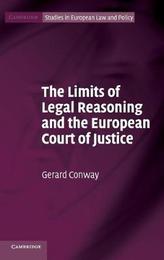
|
The Limits of Legal Reasoning and the European Court of Justice
Hardback
Main Details
| Title |
The Limits of Legal Reasoning and the European Court of Justice
|
| Authors and Contributors |
By (author) Gerard Conway
|
| Series | Cambridge Studies in European Law and Policy |
|---|
| Physical Properties |
| Format:Hardback | | Pages:344 | | Dimensions(mm): Height 235,Width 158 |
|
| ISBN/Barcode |
9781107001398
|
| Classifications | Dewey:347.24012 |
|---|
| Audience | | Postgraduate, Research & Scholarly | |
|---|
|
Publishing Details |
| Publisher |
Cambridge University Press
|
| Imprint |
Cambridge University Press
|
| Publication Date |
12 January 2012 |
| Publication Country |
United Kingdom
|
Description
The European Court of Justice is widely acknowledged to have played a fundamental role in developing the constitutional law of the EU, having been the first to establish such key doctrines as direct effect, supremacy and parallelism in external relations. Traditionally, EU scholarship has praised the role of the ECJ, with more critical perspectives being given little voice in mainstream EU studies. From the standpoint of legal reasoning, Gerard Conway offers the first sustained critical assessment of how the ECJ engages in its function and offers a new argument as to how it should engage in legal reasoning. He also explains how different approaches to legal reasoning can fundamentally change the outcome of case law and how the constitutional values of the EU justify a different approach to the dominant method of the ECJ.
Author Biography
Gerard Conway is a lecturer in law at Brunel University in London. He has also been a visiting lecturer at the University of Buckingham.
Reviews'Conway's study is timely, well argued, intelligent and provocative ... [His] highly intelligent book provides an excellent entry to the study of the decision making of the Court of Justice. He shows that the Court has a predisposition towards a meta-communautaire reading of the treaties in those cases where it matters most.' Gunnar Beck, International and Comparative Law Quarterly 'With the help of case studies of landmark decisions, Conway ... demonstrates impressively where the reasoning of the Court on the interpretation of EU law seemed to fail to articulate alternative choices and thereby create a sense of inevitability of the Court's solution ... [The] Limits of Legal Reasoning is in my view definitely a much-needed, thought-provoking contribution to EU law scholarship, whether you find yourself in agreement with the Court's conclusions or not.' B. Pirker, European Law Blog (europeanlawblog.eu) 'Gerard Conway has ... written an undeniably important book. Praise is due for his searching, tightly knit dissertation, which succeeds in rekindling a fire that has petered out too soon. The principal critique of the Court's creative jurisprudence is well founded, and his alternative theorems merit further scholarly discussion.' Henri De Waele, European Law Review 'Conway normatively discusses the limits of legal reasoning of the Court ... Such a proposition might be perhaps difficult to digest in some of the more traditional quarters of EU law scholarship. It could be seen, however, rather than the indictment of what and how the Court has done in the past, as the suggested recipe for the future. Conway's own conclusion confirms that his main argument is prospective: in a transformed, differentiated and sceptical Union of today, the linear narrative of further integration translated into one-sided reasoning of the Court becomes more of a problem than a solution.' M. Bobek, European Law Review '... well worth studying closely ... based on thorough research and knowledge of the case law and of EU law, and also of the relevant literature.' Joxerramon Bengoetxea, European Constitutional Law Review
|